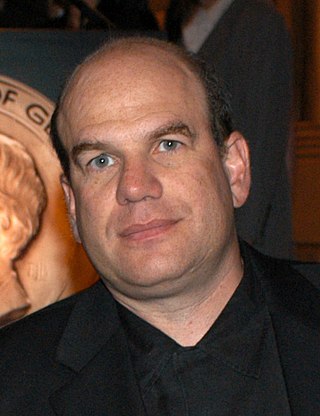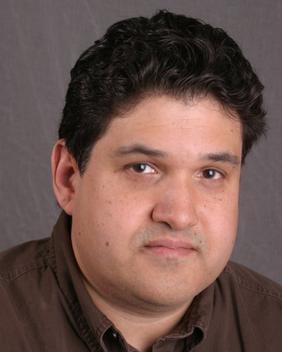External links
Bonnie Mark at IMDb
Bonnie Mark | |
|---|---|
| Occupation | Television Writer |
| Nationality | American |
| Period | 1994–2011 |
| Notable works | Third Watch |
Bonnie Mark is an American former television writer and producer. She worked on the ABC crime drama NYPD Blue and the NBC crime dramas Third Watch and Homicide: Life on the Street . She was nominated for a Writers Guild of America Award for her work on Homicide. [1]
Mark began working in television as a script co-ordinator for the first season of Homicide: Life on the Street in 1993. The series was executive produced by Tom Fontana and focused on a single squad of homicide detectives in the Baltimore police department. She was promoted to staff writer for the second season in Spring 1994. She remained a staff writer for the third season in Fall 1994. She contributed to four third-season episodes as a writer. She wrote the teleplay for the episode "Fits Like a Glove" from a story by Fontana and story editor Julie Martin. Mark, Fontana and Martin were nominated for a Writers Guild of America Award for episodic drama at the February 1996 ceremony for writing "Fits Like a Glove". [1] She co-wrote the story for the episode "The City That Bleeds" with executive story editor James Yoshimura, Martin and story editor Jorge Zamacona wrote the teleplay. She co-wrote the teleplay for the episode "Law and Disorder" with Martin from a story by Yoshimura and co-executive producer Henry Bromell. She wrote the teleplay for the episode "Nothing Personal" from a story by Yoshimura and Fontana. She was promoted to story editor for the fourth season in 1995. She wrote the teleplay for the episode "Autofocus" from a story by Fontana and Bromell. She left the series at the end of the fourth season. She contributed to five episodes in total as a writer.
She served as an executive story editor for the police drama High Incident in 1996. The show featured eight suburban police officers at work performing street law enforcement and in their home lives. The show was created by Steven Spielberg, Michael Pavone, Eric Bogosian and Dave Alan Johnson.
In 1997 she worked as a writer for the HBO drama Feds . The series was created and executive produced by Dick Wolf. She wrote the episode "Smoking Gun". The show was canceled after one season. Also in 1997 she served as a co-producer for the short-lived crime drama C-16: FBI .
In 1998 she worked as a co-producer for the new legal drama series Michael Hayes . The series was created by Paul Haggis and John Romano. It focused on a new deputy prosecutor in New York. It was canceled while airing its first season.
In 2000 she served as a producer for the pilot of psychiatric drama Wonderland . The show was created by Peter Berg and focused on doctors at a psychiatric inpatient facility. Mark did not return when the series was picked up. The show was canceled after eight episodes.
In 2001 she became a supervising producer and writer for the NBC emergency services drama Third Watch . The show was created by retired police officer Edward Allen Bernero and television producer John Wells. She wrote four second-season episodes; "The Tys That Bind", "Run of the Mill", "A Rock and a Hard Place" and "Walking Wounded". She left the crew after the second season ended.
In 2002 she served as a supervising producer for the short-lived drama series The Court . Also in 2002 she served as a consulting producer and writer for the police drama Robbery Homicide Division . The series was created by Barry Schindel and executive produced by Michael Mann and focused on a Los Angeles homicide unit. She wrote the story for the episode "In/Famous", Frank Spotnitz wrote the teleplay.
She was hired as a co-executive producer for the eleventh season of ABC police drama NYPD Blue in 2003. The series was created by David Milch and Steven Bochco and followed a New York homicide unit. She co-wrote the story (with retired police officer and executive producer Bill Clark) and wrote the teleplay for the episodes "Shear Stupidity" and "Passing the Stone".
In 2005 she served as a co-executive producer for new ABC drama Eyes . The show follows a firm of fringe private investigators. The series aired as a mid-season replacement and was canceled after six episodes.
Mark's last credits are in 2011, writing three episodes for Star Wars: The Clone Wars .
Bonnie Mark at IMDb

Dorothy Catherine Fontana was an American television script writer and story editor, best known for her work on the original Star Trek series and several Western television series.

David Judah Simon is an American author, journalist, screenwriter, and producer best known for his work on The Wire (2002–08).

The first season of Homicide: Life on the Street, an American police procedural drama television series, originally aired in the United States on NBC between January 31 and March 31, 1993. The show was created by Paul Attanasio, with film director Barry Levinson and television writer and producer Tom Fontana serving as executive producers. Adapted from David Simon's 1991 non-fiction book Homicide: A Year on the Killing Streets, the season followed the fictional detectives of Baltimore Police Department homicide unit and the murder cases they investigate. The show was broadcast on Wednesdays at 9 p.m. EST, with the exception of the series premiere, which aired immediately after Super Bowl XXVII.

The second season of Homicide: Life on the Street, an American police procedural drama television series, originally aired in the United States between January 6 and January 27, 1994. Due to low Nielsen ratings during the first season, NBC executives decided to order only a four-episode season, after which they would evaluate the ratings and decide whether to renew the show. Homicide was moved to a new timeslot of Thursdays at 10 p.m. EST, temporarily replacing the legal drama L.A. Law. NBC requested several changes from the series, including fewer episode subplots and less camera movements and jump cuts.
Alfred Henry Bromell was an American novelist, screenwriter, and director.

David Eugene Mills was an American journalist, writer and producer of television programs. He was an executive producer and writer of the HBO miniseries The Corner, for which he won two Emmy Awards, and the creator, executive producer, and writer of the NBC miniseries Kingpin.
Diane Frolov is an American television writer and producer. She has written for several television shows, including The Sopranos and Northern Exposure. She frequently co-writes episodes with her husband, Andrew Schneider.
James Yoshimura is an American writer and producer, best known for his screenwriting work on the NBC series Homicide: Life on the Street and the short-lived Fox series The Jury, for which he served as a co-creator. He also co-wrote Homicide: The Movie, a made-for-television film that came out in 2000, after the series ended. Yoshimura has received two Emmy Award nominations: one for Homicide: The Movie and one for the Homicide episode "Subway", which also won a Peabody Award for excellence in television broadcasting.
Ted Mann is a Canadian born television writer and producer. He has worked in both capacities on the series NYPD Blue, Deadwood and Crash. In 1995 he won the Emmy award for Best Drama Series for his work on the second season of NYPD Blue.
Todd Ellis Kessler is an American television producer and writer. He has worked in both capacities on varied series including The Practice, Crossing Jordan, Kevin Hill, The Unit and The Good Wife. He has been nominated for daytime and primetime Emmy Awards and a Writers Guild of America Award.

Melinda Hsu Taylor is an American television writer and producer, co-creator and showrunner of Tom Swift and showrunner of Nancy Drew for the CW Network.
Kim Clements is an American television writer and producer. She has worked in both capacities on the series Wanted, The Black Donnellys, Shark, and My Own Worst Enemy. Clements won the Writers Guild of America (WGA) Award for Best Dramatic Series for her work on Lost.

Jennifer M. Johnson is an American television writer and producer.
Michael S. Chernuchin is an American television writer and producer. He has worked on the NBC crime dramas Law & Order and Brooklyn South. He has won a Producers Guild of America (PGA) Award and an Edgar Award.
Doug Palau is an American television writer and producer. He has worked on the ABC crime drama NYPD Blue and has been nominated for an Emmy Award and an Edgar Award.
Scott A. Williams is an American television writer and producer, as well as co-founder of Shane's Inspiration, a non-profit that builds playgrounds for kids of ALL abilities. Scott has worked on the NBC crime dramas Brooklyn South and Third Watch. He worked as a co-executive producer and writer for the Fox police procedural Bones from 2006 to 2009. He was nominated for an Edgar Award for his work on the series Brooklyn South. He is now a writer and executive producer on NCIS.
Julie Martin is an American television writer and producer. She has worked on the NBC crime dramas Homicide: Life on the Street, Law & Order: Criminal Intent, Law & Order and Law & Order: Special Victims Unit. She won a Humanitas Prize and was nominated for a Writers Guild of America Award for her work on Homicide. She has also been nominated for an Edgar Award for her work on Criminal Intent.
Jorge Zamacona is an American television writer and producer. He worked extensively on the police drama Homicide: Life on the Street and wrote the series' crossover episodes with the crime drama Law & Order. Zamacona co-created the police dramas 10-8: Officers on Duty and Wanted.
Jody Worth is an American television writer and producer. He has worked in both capacities on Deadwood and has been nominated for an Emmy Award and a Writers Guild of America Award for his work on the series. He is the son of producer and screenwriter Marvin Worth.
"Black and Blue" is the third episode of the second season of the American police drama television series Homicide: Life on the Street, and the twelfth overall episode of the series. It originally aired on NBC in the United States on January 20, 1994. In the episode, Pembleton aggressively investigates what he believes to be a police-related shooting. Amid pressure from Gee to pursue civilian suspects, Pembleton elicits a successful confession from an innocent man, leaving Gee feeling conflicted. Directed by Chris Menaul, the episode's teleplay was written by James Yoshimura based on a story by series executive producer Tom Fontana.